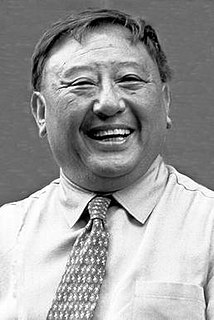A Quote by Dalai Lama
Education is the proper way to promote compassion and tolerance in society. Compassion and peace of mind bring a sense of confidence that reduce stress and anxiety, whereas anger and hatred come from frustration and undermine our sense of trust. Because of ignorance, many of our problems are our own creation. Education, however, is the instrument that increases our ability to employ our own intelligence.
Quote Topics
Ability
Anger
Anxiety
Because
Bring
Come
Compassion
Confidence
Creation
Education
Employ
Frustration
Hatred
However
Ignorance
Increases
Instrument
Intelligence
Many
Mind
Our
Own
Peace
Peace Of Mind
Problems
Promote
Proper
Reduce
Reduce Stress
Sense
Society
Stress
Stress And Anxiety
Tolerance
Trust
Undermine
Way
Whereas
Related Quotes
Through compassion it is possible to recognize that the craving for love that people feel resides also in our own hearts, that the cruelty the world knows all too well is also rooted in our own impulses. Through compassion we also sense our hope for forgiveness in our friends' eyes and our hatred in their bitter mouths. When they kill, we know that we could have done it; when they give life, we know that we can do the same. For a compassionate person nothing human is alien: no joy and no sorrow, no way of living and no way of dying.
We are beset by problems and if we look for their source, we find they arise because of our selfishness, because we tend to pursue our own interests at the expense of others. Our various religious traditions exist to help us reduce these problems. They all teach ways to overcome suffering through cultivating love and compassion, tolerance, patience and contentment.
As Shantideva says, suffering has many good qualities because it purifies our negative karma, increases our renunciation and compassion, reduces our pride, and helps us to overcome our bad mental habits. If we think in this way we will feel that difficult circumstances are our best friends. When our mind is balanced in this way it becomes as stable as Mount Meru, and nothing can cause it to shake.
Heroes are necessary in order to enable the citizens to find their own ideals, courage and wisdom in the society. The hero carries our hopes, our aspirations, our ideals, our beliefs. In the deepest sense the hero is created by us; he or she is born collectively as our own myth. This is what makes heroism so important: it reflects our own sense of identity and from this our own heroism is molded.
Common sense! It's nothing more than common sense for the preservation of our culture, the preservation of our country, the preservation and growth of our economy. And yet Jim Acosta and Glenn Thrush - and everybody in the press corps and practically every other Democrat - hears this and the only reaction they have is, "No compassion! No compassion for the less fortunate! No compassion for the victims of the world!"
Self-absorption in all its forms kills empathy, let alone compassion. When we focus on ourselves, our world contracts as our problems and preoccupations loom large. But when we focus on others, our world expands. Our own problems drift to the periphery of the mind and so seem smaller, and we increase our capacity for connection - or compassionate action.
...the gross national product does not allow for the health of our children, the quality of their education or the joy of their play. It does not include the beauty of our poetry or the strength of our marriages, the intelligence of our public debate or the integrity of our public officials. It measures neither our wit nor our courage, neither our wisdom nor our learning, neither our compassion nor our devotion to our country, it measures everything in short, except that which makes life worthwhile.
Nothing helps us build our perspective more than developing compassion for others. Compassion is a sympathetic feeling. It involves the willingness to put yourself in someone else's shoes, to take the focus off yourself and to imagine what it's like to be in someone else's predicament, and simultaneously, to feel love for that person. It's the recognition that other people's problems, their pain and frustrations, are every bit as real as our own-often far worse. In recognizing this fact and trying to offer some assistance, we open our own hearts and greatly enhance our sense of gratitude.
The first beneficiary of compassion is always oneself. When compassion, or warmheartedness, arises in us and our focus shifts away from our own narrow self-interest, it is as if we open an inner door. It reduces fear, boosts confidence and brings us inner strength. By reducing distrust, it opens us to others and brings us a sense of connection to others, and sense of purpose and meaning in life.
Our children will not survive our habits of thinking, our failures of the spirit, our wreck of the universe into which we bring new life as blithely as we do. Mostly, our children will resemble our own misery and spite and anger, because we give them no choice about it. In the name of motherhood and fatherhood and education and good manners, we threaten and suffocate and bind and ensnare and bribe and trick children into wholesale emulation of our ways.
The real troublemakers are anger, jealousy, impatience, and hatred. With them, problems cannot be solved. Though we may have temporary success, ultimately our hatred or anger will create futher difficulties. Anger makes for swift solutions. Yet, when we face problems with compassion, sincerity, and good motivation, our solutions may take longer, but ultimately they are better.
Once you develop confidence in your own ability, you'll be able to make a real contribution to creating a better world. Self-confidence is very important. Not in the sense of blind pride, but as a realistic awareness of what you can do. As human beings we can transform ourselves by our good qualities and reducing our faults. Our intelligence enables us to judge what is good from what is harmful.
When we endure our own tragedies or trials, most of us develop some empathy and compassion for others who are suffering. The trick is to keep that sense of compassion going throughout our daily lives, when we are likely to go on automatic pilot and move back into being judgmental, especially when times are tough.
Peace is not just the absence of war, it is the active presence of a capacity for love and compassion, and reciprocity. It is an awareness that our lives are not to be lived simply for ourselves through expressing our individuality, but we confirm the purpose of our lives through the work of expressing our shared sense of community in a purposeful and practical way; to sustain our own lives we sustain the lives of others - in family, in a community of neighborhoods called a city, and in a community of nations called the world.




































